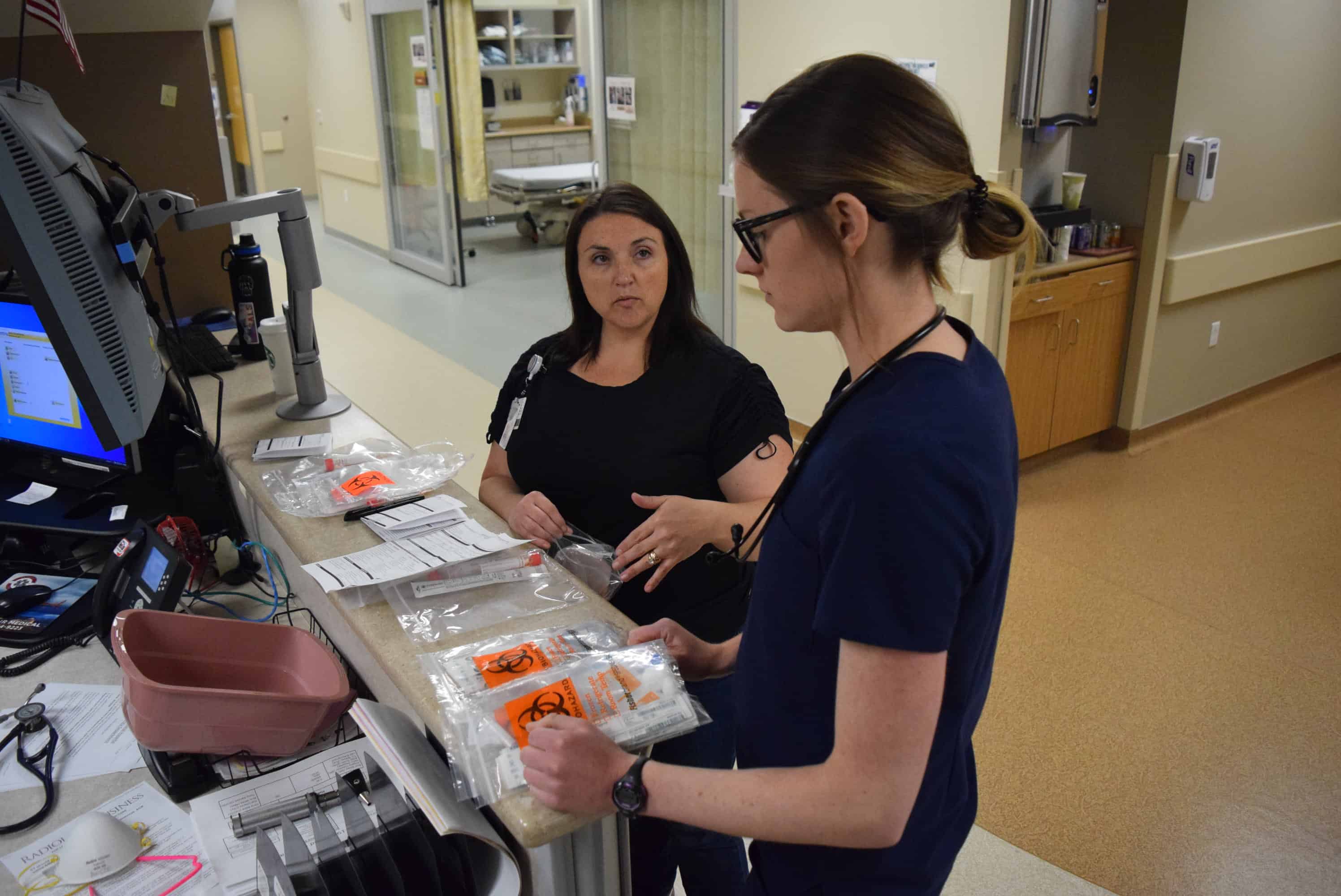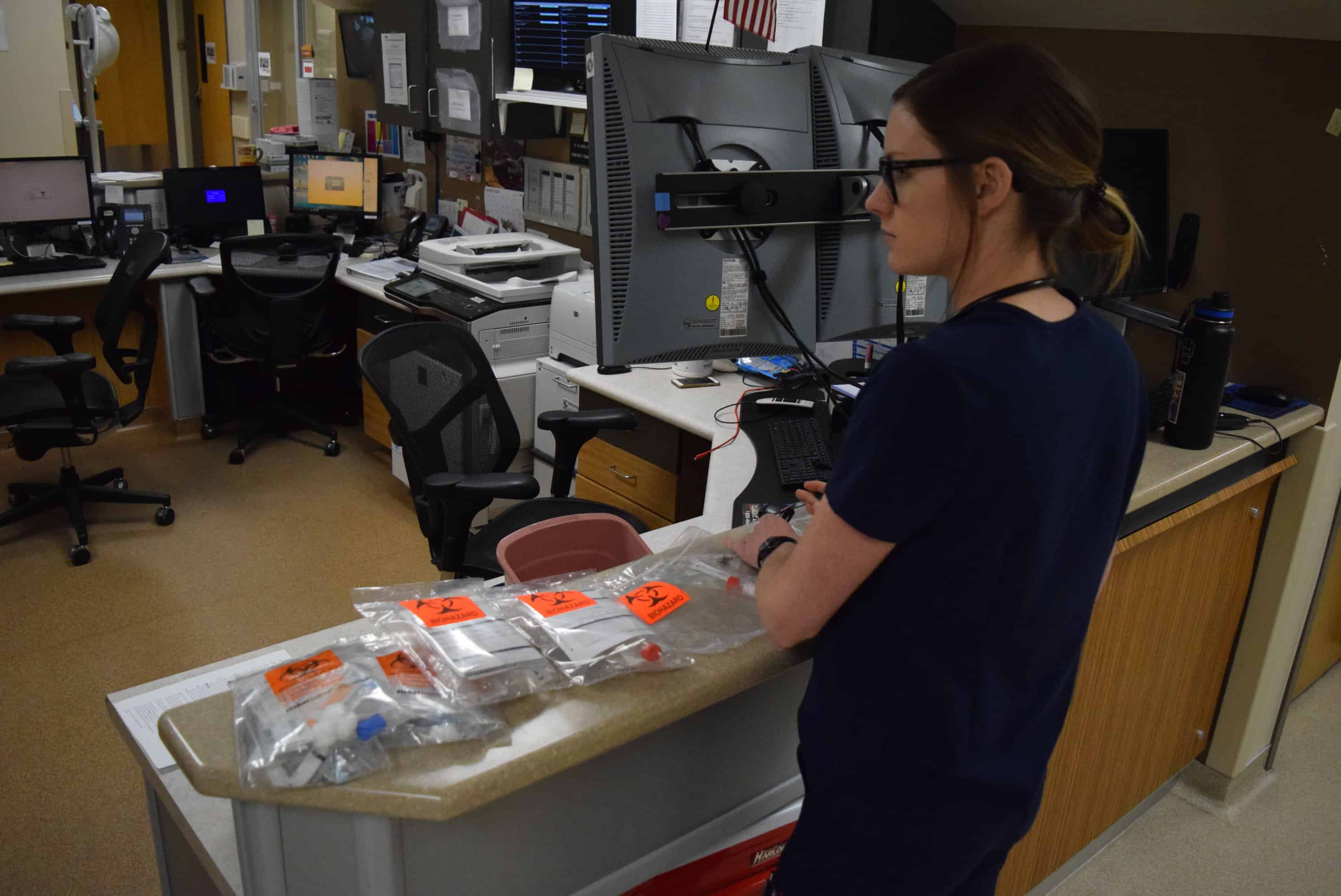Some information may be outdated.
While there remain no confirmed cases in Grand County of COVID-19, the coronavirus causing a worldwide pandemic and leading to unprecedented public health measures, that number does not comfort Moab Regional Hospital CEO Jen Sadoff.

Photo Caption: Annie Relph, Moab Regional Hospital Director of Nursing, plans for COVID-19 testing protocols with Kelley Lindsey, RN. [Photo by Maggie McGuire/Moab Sun News]
“There are absolutely people in our community with textbook symptoms,” said Sadoff, “but because they don’t meet [testing] guidelines, they are not being tested.”
A report from The Associated Press found that early mistakes by federal public health agencies led to the current shortage of laboratory tests across the nation, slowing response time and leading to testing backlogs.
Over the past two weeks, testing capacity across the country has increased after relaxed regulations allowed private companies to be involved. With those increased tests came a sudden increase in the number of confirmed cases of COVID-19.
“We cannot use the fact that there are no positive tests be a security blanket,” Sadoff said, when the odds that the disease is spreading in the community are high.
In a statement, MRH Chief Medical Officer Dr. Dylan Cole said the community needs “immediate and widespread distribution of the necessary testing capabilities that will allow healthcare workers to stop the spread of the virus,” and implored residents to reach out to demand action from state and federal lawmakers.
Testing in Grand County

[Photo by Maggie McGuire/Moab Sun News]
Those numbers don’t come close to the number of people who have called the COVID-19 hotline asking to be tested, however.
“Moab Regional Hospital has received many requests from employees who have been told by their employer that they need to be tested for COVID-19, however, it is not possible for the hospital to test everyone that wants a COVID-19 test,” reads a plea put out on the hospital’s social media.
“[We are] so limited by the CDC and Utah Department of Health guidelines about who can be tested,” said Sadoff.
As of March 24, the Utah Department of Health’s lab still has a backlog of COVID-19 tests due to “testing resource limitations” the department is currently prioritizing healthcare personnel, first responders, those with other serious illnesses and those living in communal situations (such as nursing homes, prisons or hospitalized patients) in order to control the spread of the disease.
“Please do not submit testing requests for people outside of the first priority group,” the UDOH guidelines state, “If you submit a test request for someone who does not meet the criteria outlined in group 1 above, the sample will not be tested.”
Evolving testing resource limitations are noted on the department’s COVID-19 website at coronavirus.utah.gov/
Quick tests available soon
After federal guidelines were relaxed in response to the coronavirus crisis, medical providers do have the option to order testing from other laboratories. Officials at MRH report that they have been reaching out to labs across the state to find an alternative.
“One of the big things that we’re working on right now is trying to find a source for tests,” said Sadoff, “so we can do testing locally and with a fast turnaround.”
Turnaround time for a COVID-19 test is currently around 48 hours through the state facility. Patients taking the test are sent home to wait for results.
Sadoff reported that MRH has put in an order for tests that would allow the hospital to do tests with results available in just 35 to 45 minutes and hope to have the service available in mid-April.
“That will be a real game-changer,” said Sadoff, “when we can perform our own in house tests here locally.”
“Then, if somebody is worried about whether they have COVID-19 they can come in, they can be tested and will know right away,” said Sadoff, adding that the quick testing time will allow patients and doctors to make the best decisions for how to treat patients, isolate the ill and provide care.
In the meantime, health professionals urge Moab residents to keep their distance from others even in their own homes, as well as wash hands and surfaces frequently to slow the spread of the disease.
“For now, because of the testing limits, we continue to recommend that people concerned that they have COVID-19 call our hotline at 435-719-3998 but stay home unless they think they’re in serious distress,” said Dr. Cole.
“Don’t just protect yourself like it’s here,” urged Sadoff, “protect others like you have it.”
This article includes quotes from interviews by Molly Marcello at KZMU News.
Appreciate the coverage? Help keep local news alive.
Chip in to support the Moab Sun News.




